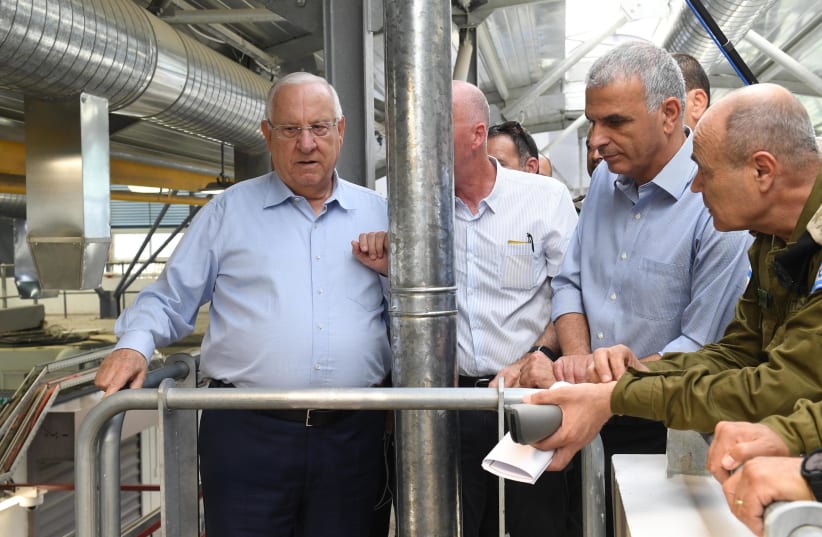Keen to observe what happens at the crowded Kalandiya checkpoint, the nightmarish crossing between Jerusalem and Ramallah which in the heat of summer tries the patience of both IDF soldiers and Palestinians passing from the West Bank into Israel for work or medical treatment, President Reuven Rivlin accompanied Finance Minister Moshe Kahlon on an inspection Wednesday. They also toured the Hashmonaim checkpoint east of Modi’in.
Accompanying them were Deputy Police Commissioner Zohar Dvir, Border Police Commander Maj. Gen. Kobi Shabtai, Military Liaison to the Palestinians Kamil Abu Rokon, and Defense Ministry Director of Crossings Erez Sidon.
The tour began at the Kalandiya observation point, where Rivlin and Kahlon were briefed by IDF ombudsman Maj.-Gen. (res) Yitzhak Brik who told them that Kalandiya is the busiest crossing in the Jerusalem region and is manned by several different defense units under the direction of the Israel Police. Some 27,000 Palestinian and Israeli pedestrians pass through daily, in addition to some 9,000 private and commercial vehicles carrying around 20,000 passengers and as hundreds of buses.
From the observation point, Rivlin and Kahlon gained a perspective of the upgrades made in recent months by the Defense Ministry’s Directorate of Crossings. They then inspected the checkpoint’s facilities for security searches, and new technologies employed as aids to safety.
At Hashmonaim, they observed the separate lanes for vehicles and pedestrians. Here they were briefed by Sidon who told them that 7,000 pedestrians cross daily, plus approximately 6,000 vehicles.
The tour was initially arranged for Kahlon who invited Rivlin to join him. The president said he appreciated the invitation as it him to see the reality on the ground.
Rivlin commended the finance minister for improving the facilities for the benefit of the civilian population.
Under the current circumstances, said Rivlin, this was also the best way to ensure the safety of Israeli civilians, “because as things stand now, we have no alternative.”
Relations with the Palestinian Authority do not allow for any geographic laxity, “and the situation is unlikely to change in the foreseeable future,” he said.
Rivlin also praised Israel Police and the IDF for carrying out their difficult task at the crossings day after day.
Kahlon concurred that he too was impressed by the technological innovations which have made security checks faster and smoother, and led to a more humane approach to the Palestinians undergoing the checks. The upgraded crossings will improve the West Bank economy, he said.
